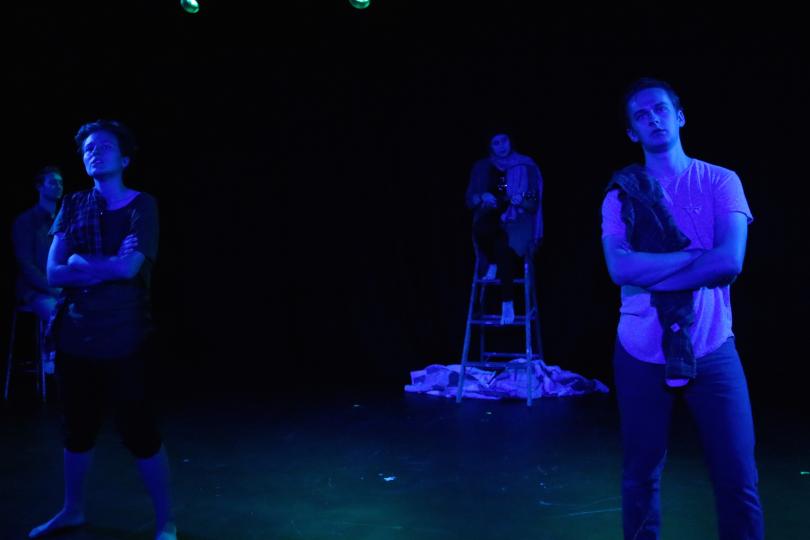What’s a Trans Theatre Student to Do?

This year’s Fringe Festival was 11 fast-paced days of uncurated, bold work. For my part, I was involved as an actor, dramaturg, and collaborator in “What You Will”, an exploration of “Twelfth Night” through transgender identity. “Twelfth Night” is one of several Shakespeare comedies in which it is generally believed a woman is dressing as a “man”. When I revisited this text before we began rehearsals, I started to have a lot of questions about our assumption that this character is cisgender (their gender aligns with the one they were assigned at birth).
Guided by these questions, I discovered that understanding Cesario (often called Viola) as a woman in disguise – while a legitimate (and the most common) choice – is not an inherent truth of the text, but a lens through which we see this story. With this insight, we as collaborators decided to explore the possibility of Cesario being a trans man. Words and phrases in the text started to fall differently on my ear.
The play is rife with language around Cesario’s identity and honestly, no one in the play can seem to quite pin down where Cesario lies on the spectrum of gender - being referred to as “a fair young man” in one scene and being told that everything about his body “is semblative a woman’s part” in the next. And while we could use the various feminine gendered terms to deny Cesario’s gender as a man, to me it opened up more questions about the complexities of this individual’s trans identity that dominant cis narratives tend to erase for the sake of palatability.
Yet, while most folks I spoke with were excited by the work being done at Fringe and the adventurous audiences, I was left with…disappointment. Not on every level - I heard feedback from trans folks who saw themselves in our work and were able to read certain details from their own lens that other folks may not see. And this feedback was immensely reassuring in a lot of ways. But, as a non-binary, trans masculine person on stage playing a trans man, I also found a certain resistance to my body and my gender in the largely cisgender audience.
Much of this resistance came from the audience. I knew the minute I walked on stage the audience would misgender not only the character, but also me as an actor. And they did – throughout the run and in reviews. They know Cesario as “Viola”, despite hearing “Cesario” as the first name he’s called. And those who don’t know Viola, see only my breasts, my hips, my soft lips and jawline. They let words like he and sir and boy pass through them and instead focus on the pitch and song of my voice. They believe the captain and the brother who call Cesario “lady” and “madam” and “sister”. They suspect Cesario talking about himself as a woman must confirm she’s a woman. Yet, the body they see and the voice they hear is what I live and speak in every day. And, people still regularly call me “she” and “lady” without my permission and I lived as a girl/young woman for most of my life before understanding my trans identity. And yet, through all of this, I am still masculine and non-binary, just as Cesario is still a man. We just both happen to live with trans experiences. There are people in the audience who, unless I explicitly say Cesario is a man and he’s trans, will never see it. They aren’t trained to see it, but they also don’t try to see it. Consequently, it becomes this tough thing – because this is exactly the problem I face daily. They don’t see Cesario as he is (and by extension, me as I am) and then, use various pieces of “evidence” to deny us our reality.
But, it’s not only the more blatant dismissal of seeing this character as a man where I found resistance to the work being done. I also got well-meaning cis mentors and cis peers who said, “We want to see trans – but can show us trans more?” And while I want to clarify unclear aspects of the play, I don’t trust these critiques. When I choose or not choose to play into this feedback, I’m constructing knowledge about what it means to have a “trans experience”. So, I’m suspect of whose version of a trans experience they want me to play into – mine or theirs from a cis perspective? And I particularly wanted to be authentic in how this one trans experience was portrayed, given that it represented a trans narrative that isn’t “typical” of what the media tends to represent (i.e. binary, “born in the wrong body”, cis-passing, entirely tragic and despairing).
So, with a certain resistance from audience, peers, and mentors, what does this mean for me – someone who is a young, trans theatre student?
I know, on one hand, it could be said that I’m putting too much pressure on myself. But on the other, I look around and I feel so much of this pressure externally too. I see the justification of trans people banned from certain spaces and the denial of our access to basic health care. I see both psychological and physical violence continue to be aimed at trans folks. I see people argue over my right to exist. I see theatre companies and artists in the Twin Cities try to make inclusive gestures towards trans people and fall flat, because there aren't actually trans people in their rehearsal rooms or the ones who are there aren't given the space to speak out safely. I see audiences continue to misgender me and other trans people when we walk on stage, and then want praise from me when they get it right.
So, when I’m the only trans person in the story, on stage, in the rehearsal room, in the classroom (and I often am), I can’t be any less than perfect. Because, when the difference between a “bad” performance and a “good” performance means continuing to justify excluding trans people or opening up space for trans people, then the stakes are too high for me to have an “off” night and to not have all the answers. And don't get me wrong - I don't think "What You Will" was a perfect show. I'm young and in need of feedback and mentorship, specifically from trans folks. But asking to see Cesario as he is in this production of "Twelfth Night" - to have the audience believe him - and then to not have that met, leaves me not knowing what to do or quite where to start. Because, how am I supposed to grow, take feedback, be vulnerable, and tell stories from my particular lens if my very existence is being denied when I walk on stage?
So I ask you: what’s a trans theatre student to do?




